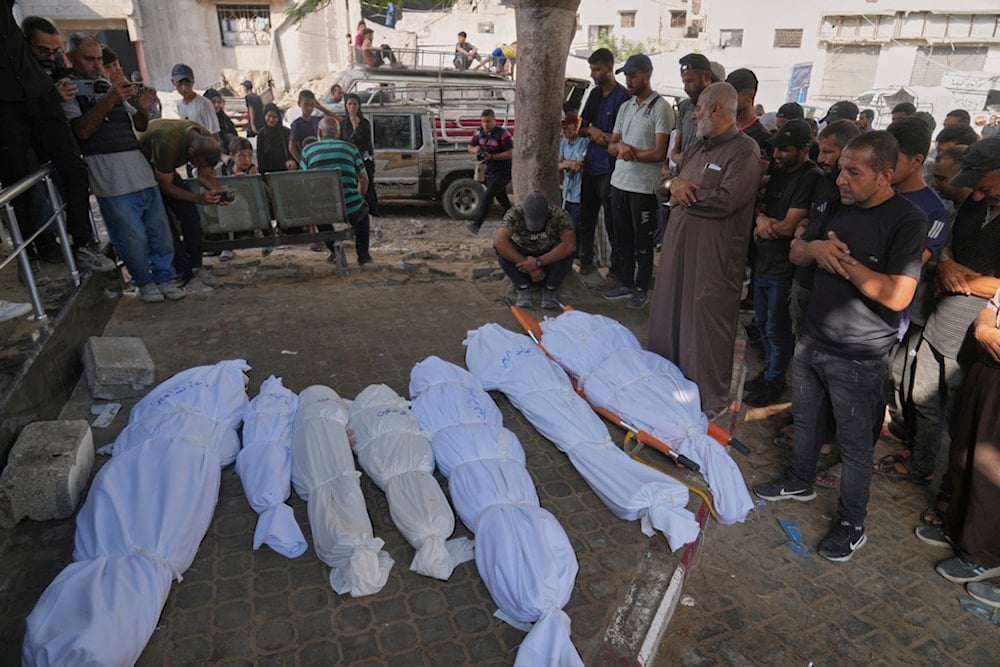'Israel’s' 'double-tap' strike on Gaza hospital must be probed: UN
The UN urges the Israeli entity to ensure accountability after a double strike on Gaza’s Nasser hospital killed 22 people, including five journalists.
-

Palestinians pray over the bodies of people who were killed in an Israeli military strike, during their funeral outside Al-Shifa Hospital, in Gaza City, Friday, August 22, 2025. (AP)
The United Nations has urged “Israel” to deliver credible accountability following the bombing of Gaza’s Nasser hospital that killed 22 people, including five journalists, in what witnesses described as a deliberate “double-tap” strike.
UN human rights office spokesperson Thameen al-Kheetan told reporters in Geneva on Tuesday that the number of journalists killed in Gaza raises “many questions about the targeting of media workers” and stressed that justice must be served.
On Monday, Israeli forces struck the Nasser Hospital in southern Gaza twice within minutes. The second strike hit as journalists and medics rushed to aid those wounded in the first blast, killing first responders and media workers. Reporters working for Reuters, Associated Press, and Al Jazeera were among the victims, alongside independent Palestinian journalists.
The attack provoked global condemnation, with the three media outlets issuing statements mourning their staff and demanding a transparent investigation.
Israeli response under scrutiny
The office of the Israeli prime minister said it “deeply regrets the tragic mishap” and promised an investigation. On Tuesday, Israeli occupation forces released initial findings, claiming the strikes targeted a Hamas surveillance camera in the hospital area and alleging that six of those killed were “terrorists".
The explanation, however, left unanswered why a second strike was launched when rescuers and journalists were already on site.
Al-Kheetan pointed out that previous investigations announced by the Israeli regime had been closed without resolution. “We have yet to see results or accountability measures,” he said.
Pattern of impunity
A report this month by Action on Armed Violence (AOAV) found that 88% of Israeli investigations into alleged war crimes in Gaza were either shut down or left unresolved. These include cases such as the February 2024 killing of at least 112 Palestinians waiting for flour in Gaza City and a May 2024 strike on a tent encampment that killed 45 people.
AOAV researchers argued that the data indicated a “pattern of impunity” in Israeli military investigations. The Israeli forces maintain that they have robust internal procedures to examine suspected violations.
Nasser Hospital is the last functioning public hospital in southern Gaza. The World Health Organization has reported that 33 of Gaza’s 36 hospitals have been damaged during the 22-month war. While the Israeli occupation has claimed Hamas uses medical infrastructure for military purposes, it has not provided evidence.
Gaza has also become the deadliest place in the world for journalists. At least 247 Palestinian media workers have been killed since the war began, according to the UN, more than in World War I, World War II, Vietnam, Yugoslavia, and Afghanistan combined. The foreign press is banned from entering Gaza, leaving Palestinian journalists as the sole reporters on the ground.
International, European pressure
The killings added to international pressure on the Israeli entity. On Tuesday, more than 200 former EU ambassadors and senior diplomats published an open letter urging member states to take action against the occupation's conduct in Gaza and the occupied West Bank. They recommended suspending arms exports, halting cooperation with complicit Israeli organizations, and prosecuting suspected war criminals from both sides if they enter European jurisdictions.
Despite mounting condemnation, the Israeli occupation is pressing ahead with its campaign to seize Gaza City, a military operation it expects to last up to five months.
Humanitarian groups warned that orders to evacuate hospitals in Gaza City would amount to a “death sentence” for patients. With hospital capacity already maxed out, the group said safe transfers were impossible.

 4 Min Read
4 Min Read








